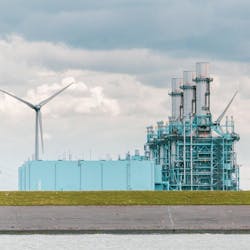Malta and Partners Receive $9M+ Grant to Support German Energy Transition
Malta Hochtemperatur Warmepumpen Stromspeicher, the German subsidiary of Malta, a developer of long-duration energy storage (LDES) solutions, German Aerospace Center (DLR), Alfa Laval, and Siemens Energy were awarded funds worth $9.62 million by the German Federal Ministry for Economic Affairs and Climate Protection (BMWK) to support Germany’s efforts to achieve Paris Agreement climate targets and to be climate-neutral by 2045.
The grant will not only fund a techno-economic analysis of the potential for Malta’s LDES technology to help decarbonize both electricity and heat generation in Germany but will also support the expansion of DLR’s test facility for thermal energy storage in molten salts (TESIS) to validate an Alfa Laval-built heat exchanger.
“This important work will identify how best to meet Germany’s decarbonization goals, create jobs in German turbomachinery manufacturing, and deliver a just transition by creating clean energy construction and operations jobs for the nation’s current energy workforce,” said Ramya Swaminathan, CEO of Malta.
Malta’s pumped-thermal energy storage (PTES) plant, a replacement for fossil-fueled power plants, generates 100 MW of clean power and 70 MW of clean heat.
It uses an industrial-grade heat pump to not only replace the carbon emissions and volatile price of fossil fuels with zero-emissions, lowest-cost-available renewable energy but also convert the electricity to thermal energy, which can be stored for hours to days.
A heat engine reconverts the thermal energy into clean power and heat when required, returning up to 90% of the original energy to the grid with little-to-no degradation over its 30+ year lifespan.
Malta’s technology allows utilities to deploy more wind and solar power without the risks of unavailability or wasting excess generation and delivers the same grid resilience and reliability services as fossil-fueled plants.
In partnership with DLR’s Institute of Engineering Thermodynamics, led by Prof. Dr. Andre Thess, the partners will analyze use cases for long-duration energy storage in the electricity grid, including grid services and heat grids, suitable market mechanisms for long-duration storage systems, identification of sites for potential deployment, and validation of an Alfa Laval heat exchanger at DLR’s TESIS facility for high-temperature, molten-salt, thermal storage technology.
About the Author
EnergyTech Staff
Rod Walton is head of content for EnergyTech.com. He has spent 17 years covering the energy industry as a newspaper and trade journalist.
Walton formerly was energy writer and business editor at the Tulsa World. Later, he spent six years covering the electricity power sector for Pennwell and Clarion Events. He joined Endeavor and EnergyTech in November 2021.
He can be reached at [email protected].
EnergyTech is focused on the mission critical and large-scale energy users and their sustainability and resiliency goals. These include the commercial and industrial sectors, as well as the military, universities, data centers and microgrids.
Many large-scale energy users such as Fortune 500 companies, and mission-critical users such as military bases, universities, healthcare facilities, public safety and data centers, shifting their energy priorities to reach net-zero carbon goals within the coming decades. These include plans for renewable energy power purchase agreements, but also on-site resiliency projects such as microgrids, combined heat and power, rooftop solar, energy storage, digitalization and building efficiency upgrades.
